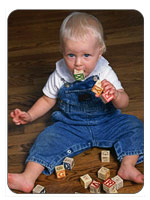The 'No, No, Nos'
Before they can say anything else, toddlers become a lean, mean no-saying machine. Usually occurring between 12 and 24 months, toddlers enjoy asserting themselves by saying ‘no’ to everything under the sun. While the no-monster in your toddler may suddenly spring up over night, remember that it is just a phase that will likely disappear as quickly as it came.
Why No?
After the first birthday, toddlers make a real progression in asserting
their independence. Saying no to everything you ask them is their way
of showing you that you’re not the only boss of them anymore. This
is also why they are likely to ignore your ‘nos.’ The fact
that your daughter’s ‘nos’ are usually said with a smile
and a laugh and maybe even a little dance shows that she is not purposely
trying to be spiteful. She just wants to test the limits of her autonomy.
While it can certainly be frustrating, bear in mind that your toddler
is learning to make decisions and think for them self, which should be
encouraged.
How To Make A No Into A Yes
Parents should never forget that their toddler looks to them for clues
as to how they should act. If you are always saying no to your son, chances
are he’ll start saying no back sooner rather than later. While there
are certainly times when saying no is called for, try to say positive
statements more often. Instead of yelling at your daughter "No running
in the living room," say "We like to walk through the living
room." Also, do your best to stay calm. An angry reaction from a
parent is likely to provoke an even more negative reaction from your toddler.
Using humor to deal with your toddler can not only help you to stay calm in the face of their constant ‘nos,’ it can also help produce a "yes!" from your toddler. When it’s time for bed, turn your daughter into a human airplane flying through her bedroom and into her bed. Is your son refusing to eat his lunch? Then ask him if he would like to eat worms like a bird, oats like a horse or insects like a frog. Of course the answer will be no, but when you ask him if he wants his hamburger, you’ll hear "Yes, yes, yes!"
Decisions, Decisions
Allowing your toddler to make some of his own choices can also curb toddler
refusal. Instead of struggling to dress your daughter every morning, ask
her if she wants to wear her pants or a skirt today. Would she like to
wear her blue top or her purple top with that? This way she can assert
her will during the dressing process and you get to avoid a fussy child.
However, there will be times when your toddler will still say no, even after they are given a choice. When this happens, be sure to explain the consequences of their no and then carry through with it if they say no again. When your son refuses to get ready to go outside, tell him that if he puts on his coat you can go to the park. But if he doesn’t put it on, then you have to stay inside. This way your toddler learns that ‘nos’ have consequences; even if he wanted to do something his no caused him not to do it.
Toddler refusal can be frustrating to parents. But, with a little patience and the words "It’s only a phase" going through your head, you can get through it.
